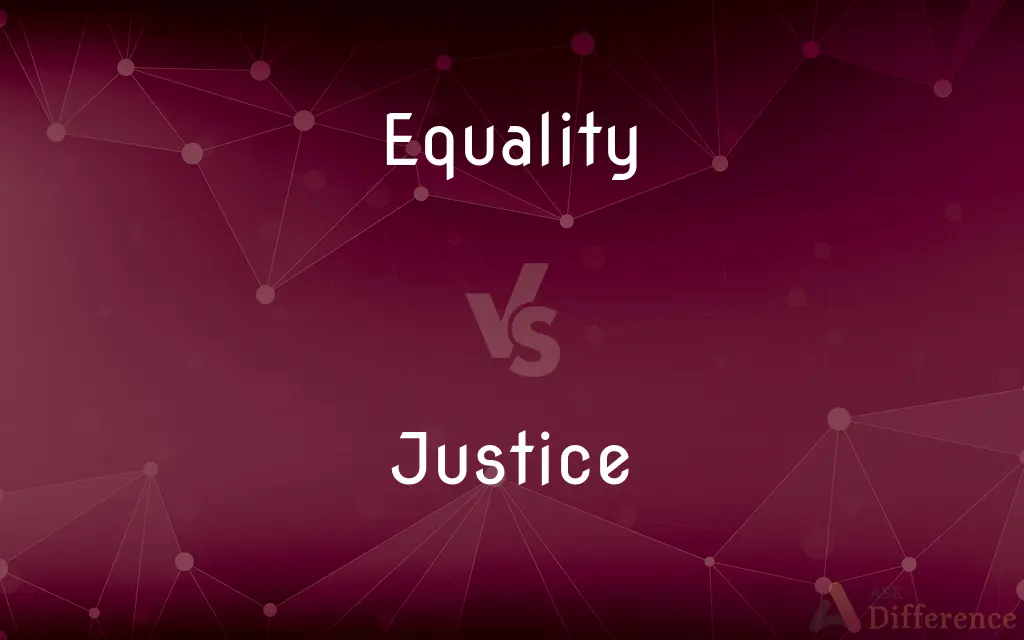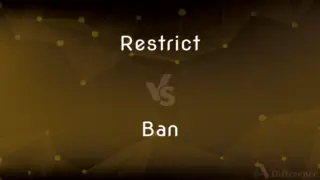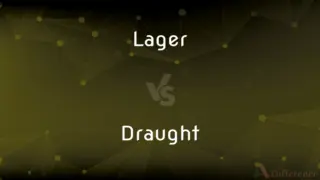Equality vs. Justice — What's the Difference?
By Urooj Arif & Fiza Rafique — Updated on March 26, 2024
Equality focuses on providing everyone with the same resources or opportunities, regardless of their starting point, while justice aims to address imbalances and ensure fair treatment by considering individual needs and circumstances.

Difference Between Equality and Justice
Table of Contents
ADVERTISEMENT
Key Differences
Equality is a concept emphasizing the idea that everyone should be treated the same way, offering identical levels of support, resources, and opportunities to all individuals. Justice, on the other hand, acknowledges that people come from diverse backgrounds and have different needs, and thus, treating everyone exactly the same may not result in fair outcomes.
The distinction between equality and justice becomes particularly relevant when discussing social issues. Equality’s approach can inadvertently perpetuate disparities by failing to address the root causes of inequality, as it applies a one-size-fits-all solution to problems that are complex and multifaceted. Justice, with its focus on equity and fairness, strives to understand and remedy the unique challenges faced by underprivileged or marginalized groups, aiming for an equitable outcome rather than a strictly equal treatment.
Implementing justice often requires a more nuanced understanding of societal dynamics and a willingness to make adjustments that specifically aim to lift those at a disadvantage. For instance, affirmative action policies in education and employment are examples of attempts to achieve justice by recognizing and addressing historical and systemic barriers that certain groups have faced.
While both equality and justice are fundamental to achieving a fair society, they operate on different premises. Equality looks at surface-level uniformity, whereas justice digs deeper into fairness and equity, recognizing that true fairness sometimes requires treating people differently, based on their circumstances and needs.
Comparison Chart
Focus
Uniform distribution of opportunities and resources.
Fair treatment that accounts for individual circumstances.
ADVERTISEMENT
Approach
One-size-fits-all, without regard to individual differences.
Tailored to address specific needs and barriers.
Goal
To ensure everyone gets the same thing.
To ensure everyone gets what they need to succeed.
Contexts
Often applied in policies aiming for universal standards.
Applied in policies aiming to correct or balance societal inequalities.
Challenges
May overlook the complexities of individual needs and systemic inequalities.
Requires a deep understanding of diverse backgrounds and societal structures.
Compare with Definitions
Equality
Advocates for identical treatment.
Equality in healthcare means every patient has the same access to treatments.
Justice
Adjusting supports to achieve fair outcomes.
Sliding scale fees in clinics provide justice by considering income differences.
Equality
Providing the same resources to all.
Every employee receives the same yearly bonus, promoting equality.
Justice
Tailors solutions to individual or group needs.
Job accommodations for disabilities are a form of justice in employment.
Equality
Assumes uniformity in needs and conditions.
Public parks are accessible to everyone, reflecting a principle of equality.
Justice
Focuses on equity rather than uniformity.
Justice in disaster relief involves prioritizing aid to the most affected areas.
Equality
Focuses on distributing opportunities equally.
A flat tax rate applies to all citizens equally, regardless of income.
Justice
Recognizes and addresses unequal starting points.
Scholarships for underprivileged students aim to achieve educational justice.
Equality
Can sometimes ignore deeper disparities.
Equality in test-taking doesn’t account for students with different learning needs.
Justice
Aims to correct imbalances.
Restorative justice programs seek to heal communities affected by crime more equitably.
Equality
The state of being equal, especially in status, rights, or opportunities
An organization aiming to promote racial equality
Justice
Justice, in its broadest sense, is the principle that people receive that which they deserve, with the interpretation of what then constitutes "deserving" being impacted upon by numerous fields, with many differing viewpoints and perspectives, including the concepts of moral correctness based on ethics, rationality, law, religion, equity and fairness. Consequently, the application of justice differs in every culture.
Equality
A symbolic expression of the fact that two quantities are equal; an equation.
Justice
The quality of being just; fairness
In the interest of justice, we should treat everyone the same.
Equality
The state or quality of being equal.
Justice
The principle of moral rightness; decency.
Equality
(Mathematics) A statement, usually an equation, that one thing equals another.
Justice
Conformity to moral rightness in action or attitude; righteousness
Argued for the justice of his cause.
Equality
The fact of being equal.
Justice
The attainment of what is just, especially that which is fair, moral, right, merited, or in accordance with law
My client has not received justice in this hearing.
Equality
(mathematics) The fact of being equal, of having the same value. en
Justice
(Law) The upholding of what is just, especially fair treatment and due reward in accordance with honor, standards, or law
We seek justice in this matter from the court.
Equality
The equal treatment of people irrespective of social or cultural differences.
Justice
The administration, system, methods, or procedures of law
A conspiracy to obstruct justice.
A miscarriage of justice.
Equality
The condition or quality of being equal; agreement in quantity or degree as compared; likeness in bulk, value, rank, properties, etc.; as, the equality of two bodies in length or thickness; an equality of rights.
A footing of equality with nobles.
Justice
Conformity to truth, fact, or sound reason
The overcharged customer was angry, and with justice.
Equality
Sameness in state or continued course; evenness; uniformity; as, an equality of temper or constitution.
Justice
Abbr. J.(Law) A judge on the highest court of a government, such as a judge on the US Supreme Court.
Equality
Evenness; uniformity; as, an equality of surface.
Justice
The state or characteristic of being just or fair.
The justice of a description
Equality
Exact agreement between two expressions or magnitudes with respect to quantity; - denoted by the symbol =; thus, a = x signifies that a contains the same number and kind of units of measure that x does.
Justice
The ideal of fairness, impartiality, etc., especially with regard to the punishment of wrongdoing.
Justice was served.
Equality
The quality of being the same in quantity or measure or value or status
Justice
Judgment and punishment of a party who has allegedly wronged another.
To demand justice
Equality
A state of being essentially equal or equivalent; equally balanced;
On a par with the best
Justice
The civil power dealing with law.
Ministry of Justice
The justice system
Justice
A title given to judges of certain courts; capitalized when placed before a name.
Mr. Justice Krever presides over the appellate court
Justice
Correctness, conforming to reality or rules.
Justice
The quality of being just; conformity to the principles of righteousness and rectitude in all things; strict performance of moral obligations; practical conformity to human or divine law; integrity in the dealings of men with each other; rectitude; equity; uprightness.
Justice and judgment are the haditation of thy throne.
The king-becoming graces,As justice, verity, temperance, stableness, . . . I have no relish of them.
Justice
Conformity to truth and reality in expressing opinions and in conduct; fair representation of facts respecting merit or demerit; honesty; fidelity; impartiality; as, the justice of a description or of a judgment; historical justice.
Justice
The rendering to every one his due or right; just treatment; requital of desert; merited reward or punishment; that which is due to one's conduct or motives.
This even-handed justiceCommends the ingredients of our poisoned chaliceTo our own lips.
Justice
Agreeableness to right; equity; justness; as, the justice of a claim.
Justice
A person duly commissioned to hold courts, or to try and decide controversies and administer justice.
Justice
To administer justice to.
Justice
The quality of being just or fair
Justice
The administration of law; the act of determining rights and assigning rewards or punishments;
Justice deferred is justice denied
Justice
A public official authorized to decide questions bought before a court of justice
Justice
The United States federal department responsible for enforcing federal laws (including the enforcement of all civil rights legislation); created in 1870
Common Curiosities
What is the key difference between equality and justice?
Equality treats everyone the same, while justice considers individual needs and circumstances to ensure fair outcomes.
Why is justice considered more effective in addressing systemic issues?
Because it directly targets and seeks to remedy the root causes of disparities, rather than applying a blanket approach.
Can an emphasis on justice lead to criticisms of unfair advantage?
Yes, but such criticisms often overlook the historical and structural inequities that justice measures aim to counteract.
How can individuals contribute to promoting justice in their communities?
By advocating for policies that address inequities, supporting marginalized groups, and educating themselves on systemic issues.
Can policies focused on equality sometimes be unjust?
Yes, because treating everyone identically doesn’t account for the varied challenges and disadvantages people face.
Is affirmative action an example of equality or justice?
Affirmative action is an example of justice, as it seeks to level the playing field for historically marginalized groups.
How do justice-oriented approaches address inequality?
By recognizing and actively correcting for systemic barriers and individual disparities, aiming for equitable outcomes.
What role does empathy play in justice?
Empathy is crucial for understanding the unique experiences and needs of others, informing fair and equitable solutions.
How can a society balance the principles of equality and justice?
By ensuring universal access to basic rights and opportunities (equality) while also implementing targeted measures to address disparities (justice).
Is it possible to achieve absolute equality or justice?
Absolute equality is unrealistic due to diverse societal needs, but striving for justice can lead to more equitable and fair communities.
Share Your Discovery

Previous Comparison
Restrict vs. Ban
Next Comparison
Lager vs. DraughtAuthor Spotlight
Written by
Urooj ArifUrooj is a skilled content writer at Ask Difference, known for her exceptional ability to simplify complex topics into engaging and informative content. With a passion for research and a flair for clear, concise writing, she consistently delivers articles that resonate with our diverse audience.
Co-written by
Fiza RafiqueFiza Rafique is a skilled content writer at AskDifference.com, where she meticulously refines and enhances written pieces. Drawing from her vast editorial expertise, Fiza ensures clarity, accuracy, and precision in every article. Passionate about language, she continually seeks to elevate the quality of content for readers worldwide.
















































